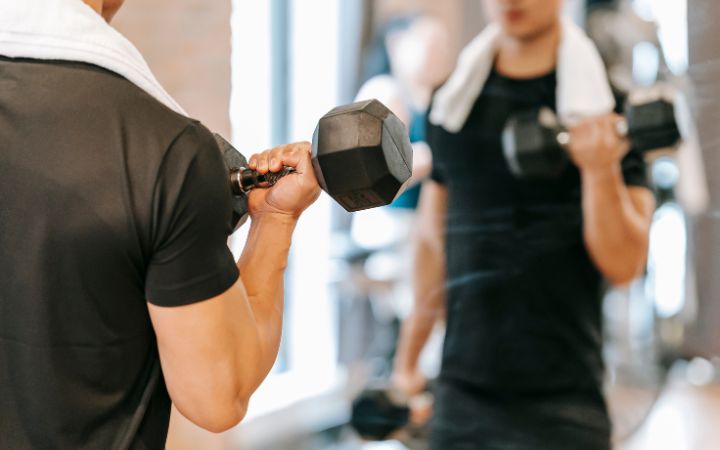Many people struggle with an addiction to masturbation either as a primary addiction or secondary. When it comes to treating a sexual behavior it’s important to treat all addictions at the same time. If you do not, you’ll likely just be transferring one addiction to another. For example, if you struggle with pornography addiction and masturbation addiction but only treat your pornography addiction, it’s likely your masturbation habits will get stronger.

What is Masturbation Addiction?
Masturbation addiction is a compulsive behavior. Sometimes the addiction is so intense that people will masturbate even without an erection, feeling aroused or even pleasure. If frequent masturbation is an obsession for you, meaning you think about it all the time to the point that it is affecting your personal and professional life then these are symptoms of masturbation addiction and you will need to work on changing the way your brain thinks.
Masturbation addiction occurs when someone can no longer control their urge to masturbate and their frequency of masturbation goes beyond what is considered to be normal therefore, compulsively engage in this behavior. There isn’t much research into masturbation addiction because it’s a stigmatized topic. However, some people who struggle with this disorder do report feeling ashamed about it.; online or in-person.
A masturbation addict cannot suppress their urges to masturbate and, consequently, compulsively engage in the behavior. Using the term “masturbation addiction” is controversial, as there is not significant enough research to support it being a standalone diagnosable condition.Many professionals refer to it as “compulsive masturbation,” which may occur as a symptom of other diagnosable disorders. Unfortunately, research is limited due to social stigma and personal shame.
Although masturbation is a healthy practice in moderation, excessive masturbation or increased masturbation frequency may bring with it many negative consequences. In either case, healthy or unhealthy, it is considered a relatively taboo topic often due to familial, societal, or religious shame associated with masturbation. Effects of masturbation and compulsive masturbation addiction can affect both males and females equally.
Masturbation addiction is unlike many other addictions like alcohol, smoking, substance use, food, sex, and even porn. With those addictions you can physically separate yourself from the thing that is causing your addiction to make fighting the addiction easier. For example, with alcohol addiction you can pour it all down the drain, with food you can control what food comes into your home, and even with sex and porn, you can physically separate yourself from your computer or people but when it comes to excessive masturbation, that part of your body is always going to be with you wherever you go which makes it that much more difficult to stop.
How to Treat Excessive Masturbation
Human sexuality is how people experience and express themselves sexually. I personally do not think it’s my place to tell you whether or not you can or cannot masturbate. Finding sexual pleasure is a natural part of being a human. Most of my students do not quit masturbating entirely – they just want to not be addicted to it and do not want to experience the negative effects of the addiction.
The first thing you’ll need to do is come up with compromise, a number in your head of what you believe to be a healthy amount of time masturbating with not negative effects. For some, this may be 4 times per week, for others, it may be never. This is a very personal decision and one that is going to be different for everyone depending on their own values, world view, and even religion.
Once you have that number in your head, you’ll need to make a schedule for when this would take place that doesn’t interfere with your life. For example if you choose 4 times per week it might look like Sunday, Tuesday, Thursday, Saturday. Once you figure out the days then you’ll want to figure out the time of day. For example, 5:30pm after work, 10:00pm while in bed, whatever time you choose that doesn’t interfere with the other things going on in your life. And last, these sessions should be without the use of pornography because if you are addicted to pornography you are trying to quit that as well.
Resetting the Brain
To get started, you are going to come up with a quit date and will go 30 days without masturbating at all. This is going to help reset and retrain your brain. While you are going cold turkey, you will want to work through a program like CSPMA, that takes a holistic approach. This means you should focus your energy on your physical health, psychological health, your relationships, Now, if are in a relationship and still want to have sex and you do not have a sex addiction, that’s perfectly okay. If you are having sex and cannot perform (which is common for those who suffer from compulsive masturbation addiction) or don’t find pleasure then it’s important to relax, take a step back and try again another time but do not resort to masturbating as that will reset your 30 day clock.
Once you are done with the 30 days and really working through a program, then you can start to implement your masturbation schedule if you have one. If you start to waver from the specific time you have set or increase the number of days then you’ll know you are going back to old habits and will then either have to start again with 30 days or if you catch it quick enough make sure you go back to sticking to your schedule.
Getting Started
It’s time for you to start thinking of what you want your personal outcome to be and as you are thinking of that continue to work through an addiction program. Here are some things to help get you started:
1. You will need to get yourself into any program to help with sexual behaviors
2. You will need to find someone to support you through this. It doesn’t have to be specifically masturbation addiction related but someone who can be there for you through tough times; a coach, a mentor, etc.
3. You need to decide if you want this for the long-haul or if you want to go back to your old lifestyle. A new lifestyle is going to take a lot of healing and energy at the same time.
4. You will need to set goals and develop a plan to achieving those goals. CSPMA can help with that.
5. If you are struggling with any mental health condition or mental disorder it’s important to talk to a mental health professional. Therapy, counselling or even peer mentoring might be a good treatment option for you especially if you have struggled with past trauma. People who recover from chronic masturbation addiction see improvements on their sexual relationships, their personal life and their social life. People also say they take less sexual risks and talk about the mental and physical health benefits. The students who have completed this program here at CSPMA report that their quality of life has significantly increased and their mental health issues have decreased.



 By submitting your contact details, you are providing your data to Center For Sex, Porn And Masturbation Addiction who may contact you.
By submitting your contact details, you are providing your data to Center For Sex, Porn And Masturbation Addiction who may contact you.